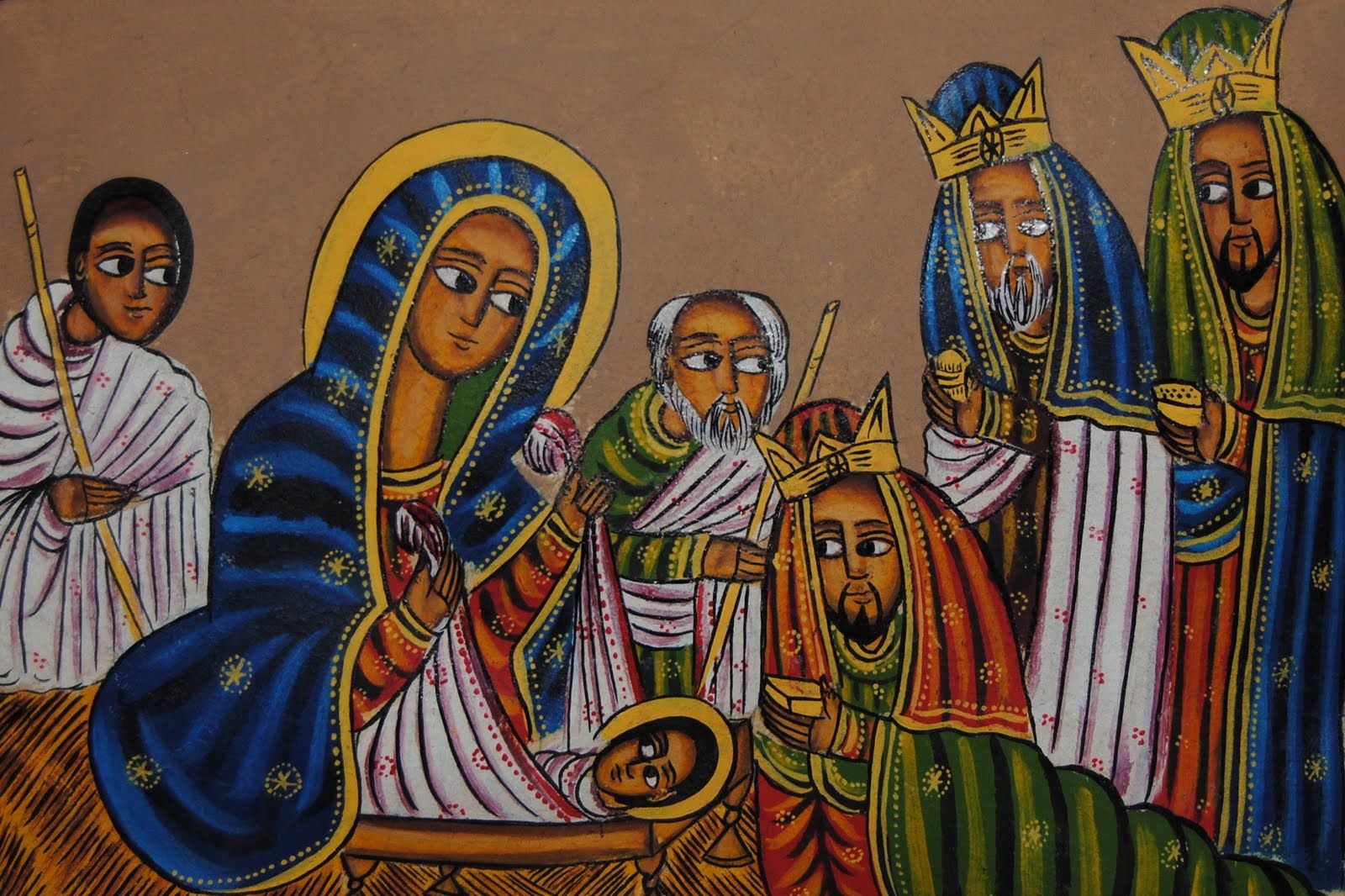
I had a small DJ set to complete the other weekend, just for a friends fiftieth birthday part. I thought I would place the selection of records that I played that night onto KYPP as a few party guests were asking for details of the records. I only managed time to fit in nine reggae 12″ records out of the twelve reggae 12″ records which I took along on the night, which lasted just under an hour, before the main DJ continued his rather fine punk and post punk set. I have placed up the eight records that got a dust off and an airing on the night in the order that I placed them on the turntable and added the extra four that did not get an airing due to the time limitations.
I have used this years Ethiopian Christmas celebrations as an excuse to place up this KYPP post. The original 12″ records uploaded today were all recorded during that golden period for semi-militant ‘back to Africa’ classics, the period between 1977 – 1979. I have placed those twelve original 12″ records that I had taken along to that DJ set onto this post as a nod to the twelve tribes of Israel. Each record is recorded separately with small descriptions of each tribe of Israel underneath the recorded works and sleeve artwork. Also the whole ‘set’ is recorded in all it’s entirety (above) if you prefer to download that instead of individual tracks, the file is around 190MB but probably worth it… The tracks in this ‘set’ are not mixed or tampered with overdubs and sirens as they could have been during a live situation. I only have one deck at home and no sound generators, so just the plain records from start to finish!
One last thing… Before I get comments and / or complaints about the Militant Barry track ‘praising’ Idi Amin as a new world (in 1977) black statesman and ruler of his country Uganda I am aware of all the suffering this despot savagely dished out on his countrymen, black, white or Asian from his presidential start in 1971. I can only defend this track from afar, if defend is the correct word to use. The track was released the same year as Sex Pistols ‘God Save The Queen’ and is made in a similar anti monarchy mould as the Pistols track. Militant Barry turning his back on the old ‘leader’ of Uganda, Queen Elizabeth II during her silver jubilee year and looking to the reign of this black leader in Africa, Idi Amin to ‘free black people’. This of course may well have been in hindsight, a bad choice. I am sure in 1977 both Militant Barry and Keith Hudson the producer / engineer sitting thousands of miles away in the ghettos of Kingston would not have known just how bad the previous years of Idi Amin’s reign were and how things would be turning out in Uganda in the next couple of years with a dirty war against Tanzania to eventually look forward to before Idi Amin exiled himself to Libya and then Saudi Arabia.
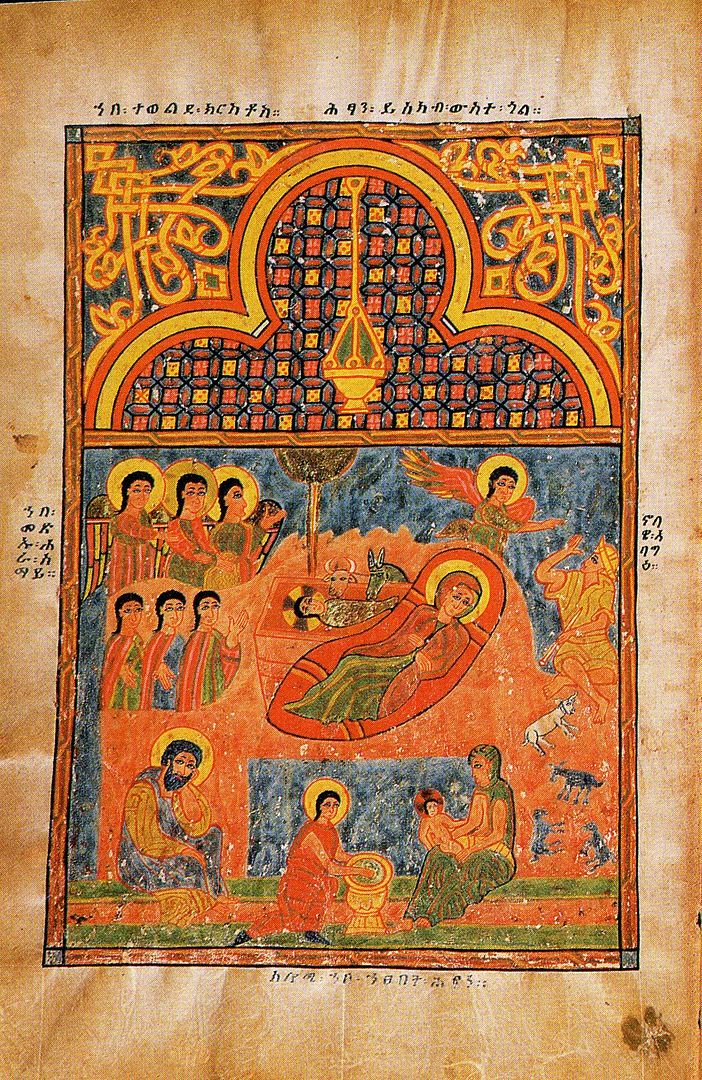
The Ethiopian Christmas:
The Ethiopian Christmas known as Ganna is celebrated on January 7th. This celebration takes place in ancient churches carved from solid volcanic rock and also in modern churches that are designed in three concentric circles. Men and boys sit separately from girls and women. Also the choir sings from the outside circle.
People receive candles as they enter the church. After lighting the candles everyone walks around the church three times, and then stands throughout the mass, which may last up to three hours.
Food served at Christmas usually includes injera, a sourdough pancake like bread. Injera serves as both plate and fork. Doro wat, a spicy chicken stew might be the main meal. A piece of the injera is used to scoop up the wat. Baskets decorated beautifully are used to serve the wat.
Gift giving is a very small part of Christmas celebration. Children usually receive very simple presents such as clothing.
In Ethiopia Christmas day is January 7, so on Christmas Eve the city is crowded with pilgrims from all parts of the country. They remain outdoors all night, praying and chanting. In the morning, a colourful procession makes its way to a nearby hilltop where a service is held. Three young men march at the head of the crowd, lashing whips from left to right to keep the people in line. Those who worship are fed with bread and wine that has been blessed by priests. After the service is over the rest of the day is spent dancing, playing sport and feasting.
Ethiopian Calendar:
Ethiopia has its own ancient calendar. The Ethiopian Calendar has more in common with the Coptic Egyptian Calendar. The Ethiopic and Coptic calendars have 13 months, 12 of 30 days each and an intercalary month at the end of the year of 5 or 6 days depending whether the year is a leap year or not. The Ethiopian calendar is much more similar to the Egyptian Coptic calendar having a year of 13 months, 365 days and 366 days in a leap year (every fourth year) and it is much influenced by the Ethiopian Orthodox Tewahedo Church, which follows its ancient calendar rules and beliefs. The year starts on 11 September in the Gregorian calendar or on the 12th in (Gregorian) Leap Years. The Coptic Leap Year follows the same rules as the Gregorian so that the extra month always has 6 days in a Gregorian Leap Year.
The Ethiopic calendar differs from both the Coptic and the Julian calendars. The difference between the Ethiopic and Coptic is 276 years. In spite of this, the Ethiopic Calendar is closely associated with the rules and the different calculations influenced by the Coptic Church and the Ethiopian Orthodox Tewahido Church. Based upon the ancient Coptic Calendar, the Ethiopian Calendar is seven to eight years behind the Gregorian calendar, owing to alternate calculations in determining the date of the annunciation of the birth of Jesus.
The Coptic New Year is a holiday in Ethiopia. Christmas falls on the 7th of January as in the Orthodox “old” calendar. Likewise, Epiphany is on the 19th of January. Easter would appear to be calculated according to the Orthodox calendar also. An Egyptian Coptic source simply describes the date of Easter as being “the second Sunday after the first full moon in Spring.”
Twelve Tribes of Israel:
Twelve Tribes of Israel, in the Bible, the Hebrew people who, after the death of Moses, took possession of the Promised Land of Canaan under the leadership of Joshua. Because the tribes were named after sons or grandsons of Jacob, whose name was changed to Israel after he wrestled an angel of the Lord, the Hebrew people became known as Israelites. Jacob’s first wife, Leah, bore him six sons: Reuben, Simeon, Levi, Judah, Issachar, and Zebulun. Each was the father of a tribe, though Levi’s descendants (among whom were Moses and Aaron), the priests and temple functionaries, were dispersed among the other tribes and received no tribal land of their own. Two other tribes, Gad and Asher, were named after sons born to Jacob and Zilpah, Leah’s maidservant. Two additional tribes, Dan and Naphtali, were named after sons of Jacob born of Bilhah, the maidservant of Rachel, Jacob’s second wife. Rachel bore Jacob two sons, Joseph and Benjamin. The tribe of Benjamin provided Israel with its first king, Saul, and was later assimilated into the tribe of Judah. While no tribe bore the name of Joseph, two tribes were named after Joseph’s sons, Manasseh and Ephraim. The ten tribes that settled in northern Palestine and were carried into captivity by the Assyrians became known as the Ten Lost Tribes of Israel.

Imhru Asher And Iration – Africa We Want To Go – Spaceark Records – 1979
REUBEN: First-born son of Jacob and Leah and father of the tribe of Reuben, one of the twelve tribes of Israel. His name comes from the Hebrew meaning: “Look, a son.” He appears in the story of the mandrakes as the one giving them to his mother (Genesis 30:14). Reuben has relations with Jacob’s concubine Bilhah, angering Jacob and probably contributing to the curse of Reuben on Jacob’s deathbed (Genesis 49:4). He succeeded in convincing his brothers not to kill Joseph but to trap him inside of a pit instead, to which he intended to return and rescue Joseph (Genesis 37:22). Later, when the family journeys to Egypt during the famine, he attempts to persuade his father that he should take responsibility for Benjamin while in Egypt (Genesis 42:37). The tribe of Reuben settled west of the Jordan River and agreed to join the other tribes in the war against the Philistines. Reuben was the firstborn of Jacob and his name means to ‘see behold, perceive, discern, or know a son’. His name was inscribed in the Emerald stone which represented healing life, birthing, rolling sea (water), turmoil (pangs, pain). Its green colour speaks of Resurrection (Life), Restoration (Healing), and Reinstatement (Forgiveness).
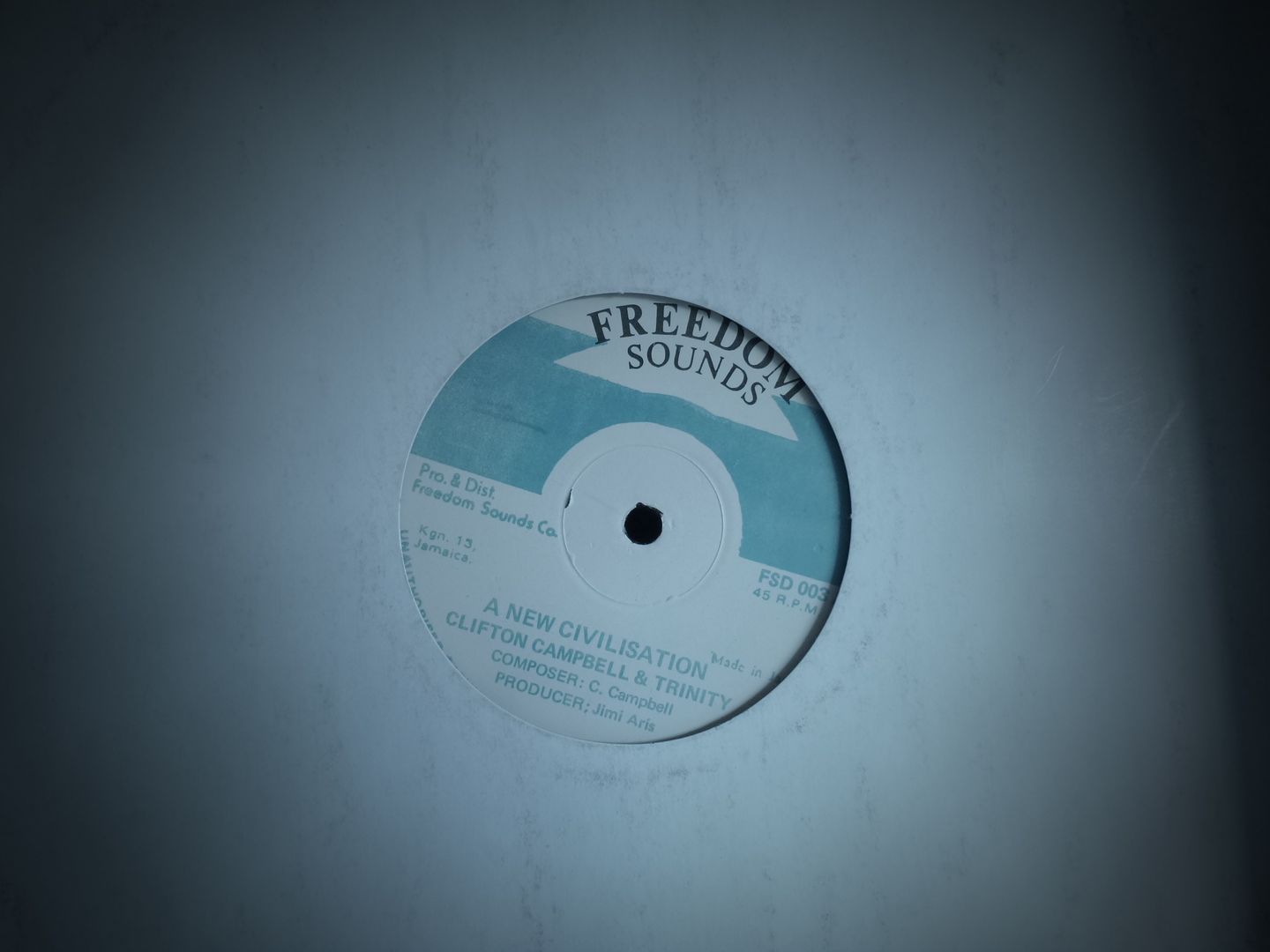
Clifton Campbell And Trinity – A New Civilisation – Freedom Sounds Records – 1978
SIMEON: Simeon was the second son of Jacob and Leah and father of the tribe of Simeon, one of the twelve tribes of Israel. The Hebrew meaning of his name means “God has heard that I was unloved” (Genesis 29:33). He and his brother Levi destroyed the entire village of Shechem in retribution for the rape of their sister Dinah (Genesis 34). Simeon was a part of the plot to sell his brother Joseph into slavery. After the family was invited to Egypt during the famine in Canaan, he was appointed as the individual to stay behind as collateral for Benjamin so that his brothers would return from Canaan. The tribe of Simeon lived in the southernmost part of the Land of Israel. The name of Simeon means to hear or to discern. It also implies obedience, content, understanding, and witness. His name was inscribed on the Sapphire stone which also means to discern. Additional meanings of the name are: to declare, to write, to inscribe, to enumerate, celebrate, proclaim, show forth and also to divide or cut.
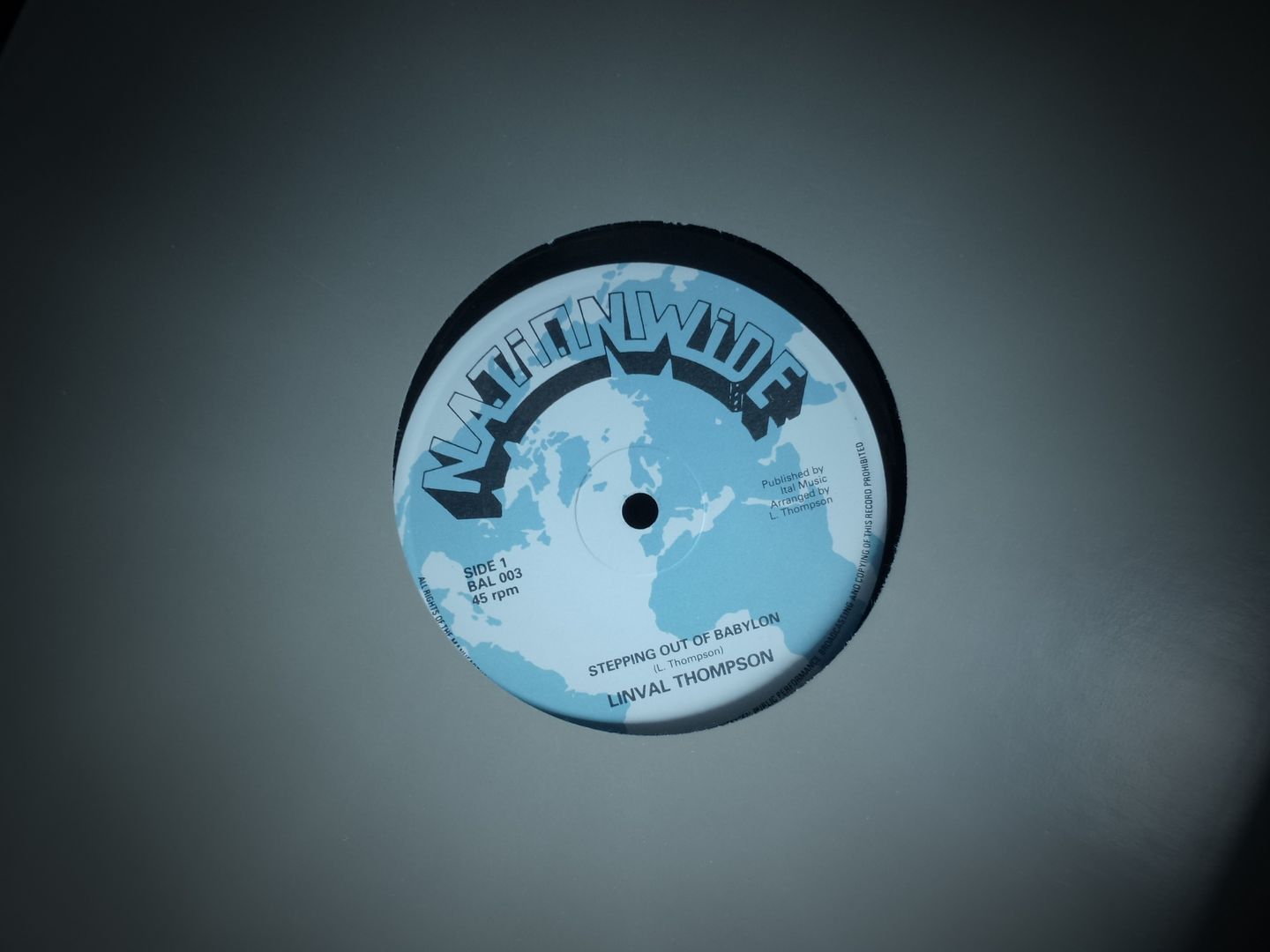
Linval Thompson – Stepping Out Of Babylon – Nationwide Records – 1979
JUDAH: Fourth son of Jacob and father of the tribe of Judah, one of the twelve tribes of Israel. His name comes from the Hebrew word of gratitude. Leah gave birth to Judah and said “Now I will praise God” (Genesis 30:35) It was his idea to sell his brother Joseph to a Midianite slave trader rather than leave him to die in the pit (Genesis 37:27). He later became the spokesman for his father Jacob and his brothers when they travelled to Egypt during the famine in Canaan. He marries Shua, a Canaanite woman, and has three sons: Er, Onan, and Shelah. Judah is also involved with Tamar and has twin sons with her named Perez and Zerach. The tribe of Judah inhabited Jerusalem during the reign of its kings David and Solomon and was later the kingdom of all of the southern tribes of Israel. Inscribed upon the Sardius Stone was the name Judah which means Praise of Jehovah and denotes the expression of praise. The Sardius stone was red in colour symbolizing blood & man. The tribe of Judah was the Regal and Ruling tribe of God. It was out of this tribe that the Lawgiver and Kings came. Blessings, joy, strength, and victory were always their portion.
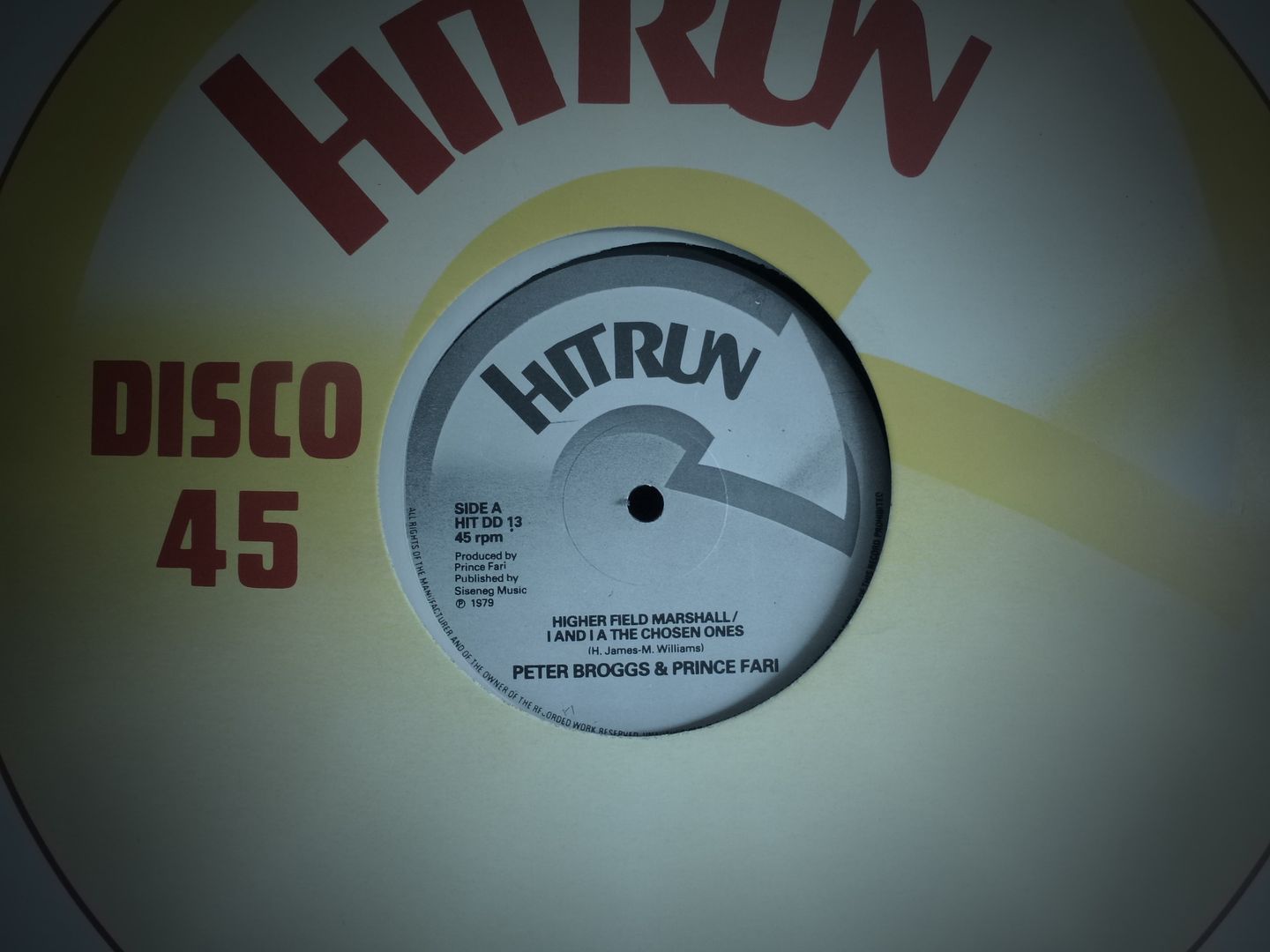
Peter Broggs And Prince Far I – Higher Field Marshall – Hitrun Records – 1979
ISSACHAR: Ninth son of Leah and father of Issachar, one of the twelve tribes of Israel. One interpretation of his name is “man of reward” (Hebrew: shcar). Issachar was the product of the mandrake incident (Genesis 30:9-18) and was involved in the plot to sell his brother Joseph into slavery. Issachar settled in Egypt after the famine in Canaan and had four sons: Tolah, Puvvah, Yov and Shimron. He receives a blessing from his father Jacob that he “bends his back to the load, working like a slave” (Genesis 49:14-15). The descendants of Issachar are men of learning according to Jewish tradition. The name of Issachar means reward or to hire for payment and was engraved upon the Topaz stone which was golden yellow and represents “to seek”. This tribe willingly accepted what was before them and with what they had. The children of Issachar were mighty men in David’s army and because of their ability to understand the times, all brethren heeded their command. No property/ Priesthood.
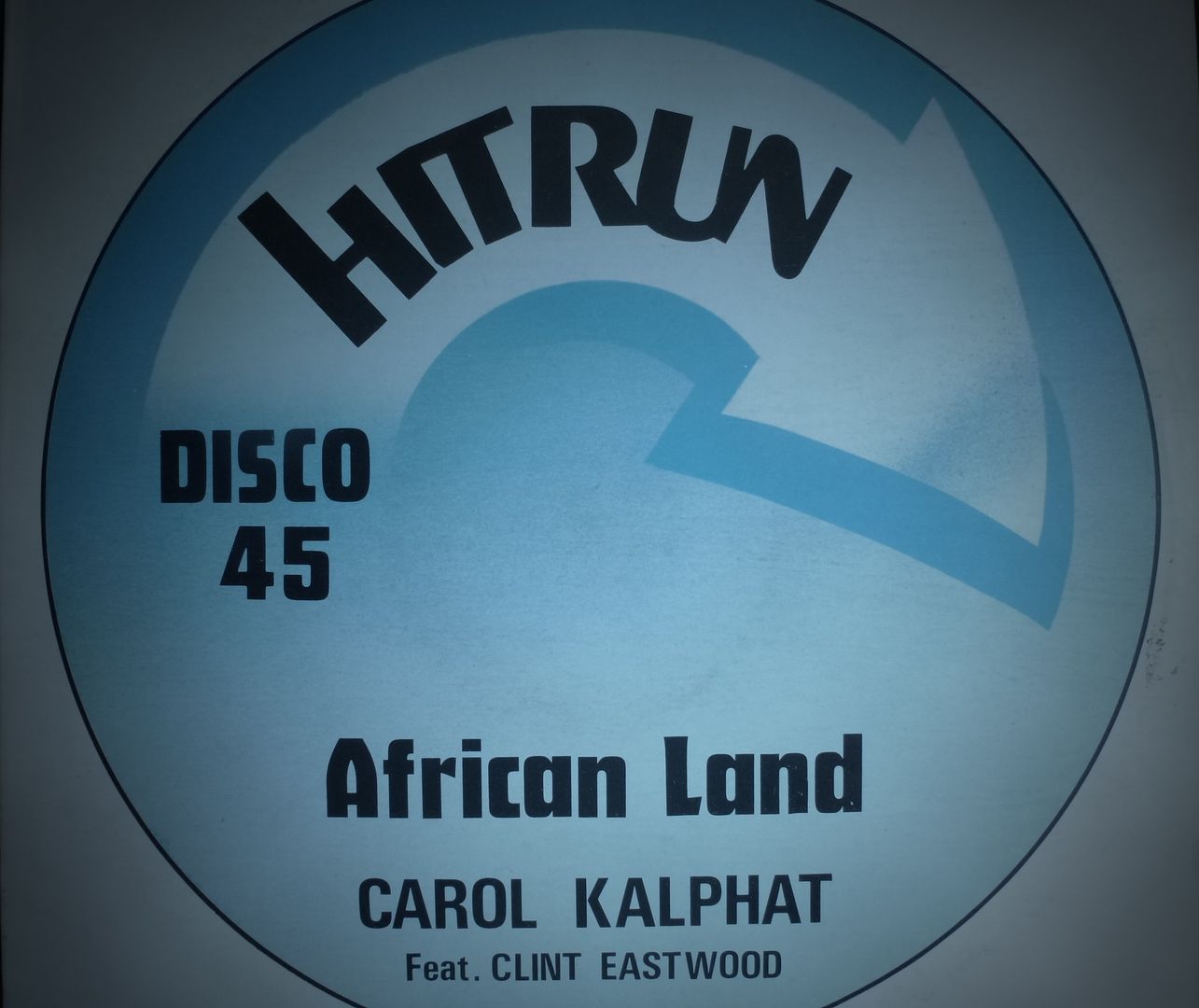
Carol Kalphat And Clint Eastward – African Land – Hitrun Records – 1978
ZEBULUN: Tenth son of Jacob and sixth of Leah and father of the tribe of Zebulun, one of the twelve tribes of Israel. When he was born Leah said “God has provided me with a good dowry” (Hebrew: zvad). He was part of the plot to sell Joseph into slavery, and later one of the group sent to Egypt to buy corn. He later lived in Egypt with his three sons Sered, Elon and Jahleel. Zebulun received the blessing from Jacob of: “Zebulun shall settle the seashores; he will be a harbour for ships; his border shall reach Sidon (Genesis 49:13). The tribe of Zebulun inhabited the northern land of Canaan. Both the tribes of Naphtali and Zebulun are mentioned as brave soldiers in the Song of Deborah during the battle against Sisera (Judges 5:18). The name Zebulun means dwelling, habitation, abiding, continuing, to reside or dwell with. The Carbuncle stone upon which the name was engraved symbolized lightning, glittering, or flashing. The tribe of Zebulun travelled and they settled on the coastlands. They were as a lighthouse, a guide in the dark, and their place of habitation became a welcome port.

The Heptones – Book Of Rules – Third World Records – 1977
GAD: Gad was the seventh son of Jacob and father of the tribe of Gad, one of the twelve tribes of Israel. His mother was Zilpah, Jacob’s concubine and Leah’s slave. Gad’s name comes from the Hebrew word troop. Leah named him Gad, saying “A troop is coming.” He was part of the plot to sell Joseph to Egypt and later sent to Egypt to buy corn during the famine in Canaan. Gad later moved to Egypt and lived there with his seven sons. Jacob blessed Gad on his deathbed, saying: “Raiders will raid Gad, but he will raid at their heel” (Genesis 49:19). The name of Gad which means to crowd upon, attack, invade, overcome was inscribed in the diamond. A diamond is a very hard stone and is unchangeable and adamant in its nature. The diamond also means to conquer, smite, break, or overcome. In 1Chr. 5:18, the scripture tells us that the tribe of Gad was skilful in warfare and they were mighty men of valour.
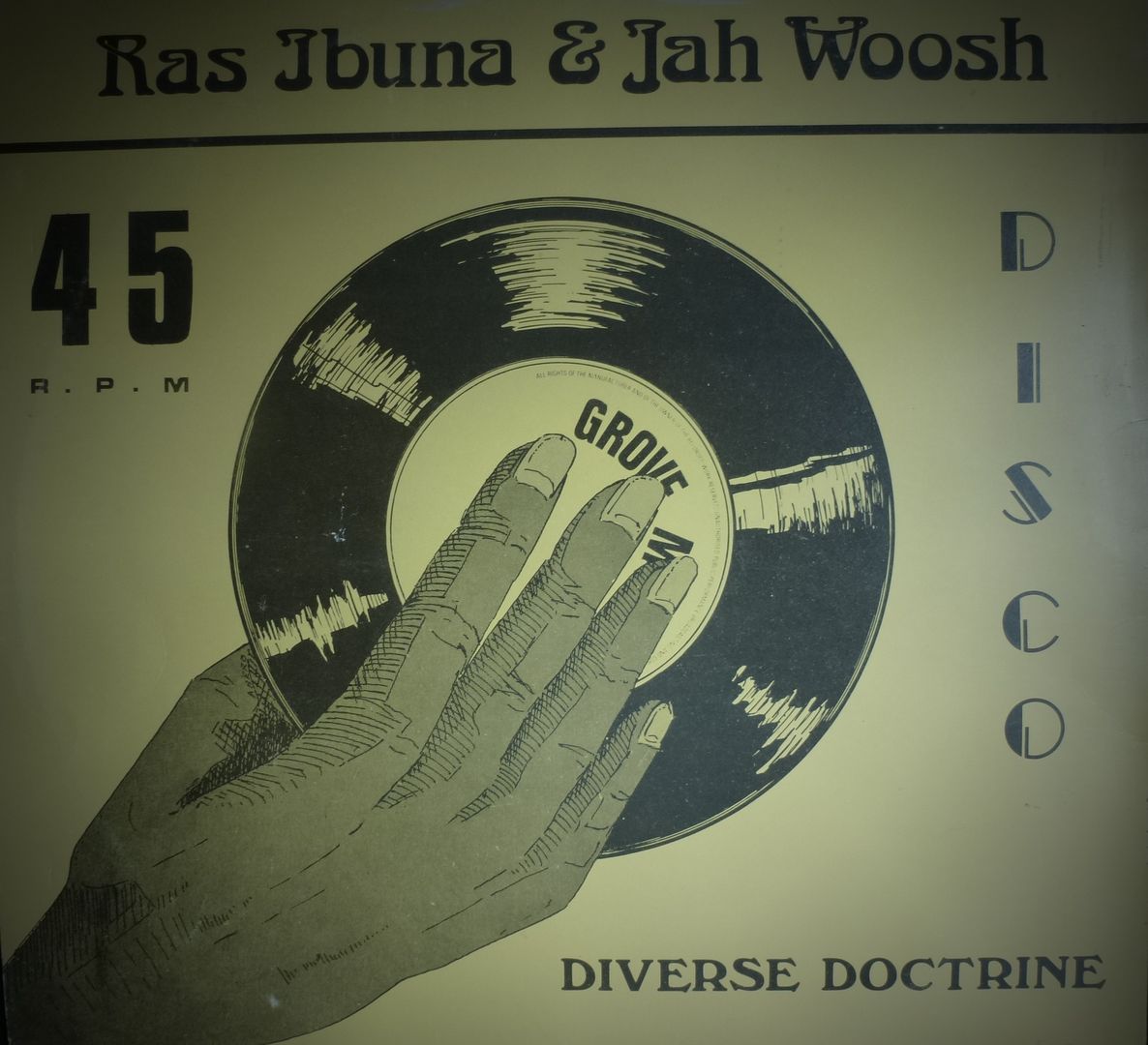
Ras Ibuna And Jah Woosh – Diverse Doctine – Grove Music Records – 1978
ASHER: Asher was the eighth son of Jacob and the father of the tribe of Asher, one of the twelve tribes of Israel. His mother was Zilpah, Leah’s maidservant. Leah named him Asher, saying “Happy am I” (Genesis 30:13). Asher played a role in the plot to sell his brother Joseph into slavery. Asher and his four sons and daughter later settled in Egypt. Jacob blessed Asher on his deathbed, saying: “From Asher will come the richest food; he will provide the king’s delights” (Genesis 49:20). The name Asher was inscribed in the Onyx stone. Asher means blessed, happy, prosper, straight, honest, go, guide, lead, and relieve. Onyx means fire /or splendour. Genesis 49:20 tells us that “Out of Asher his bread shall be fat, and he shall yield royal dainties”. Truly the richness of Asher passed on to the generations and his children were blessed.

Reggae Regular – The Black Star Liner – High School Records – 1978
DAN: Son of Jacob and Bilhah (Rachel’s maidservant) and father of the tribe of Dan and one of the twelve tribes of Israel. Dan was one of the brothers involved in the plot to sell his brother Joseph into slavery. Later, Dan’s father Jacob sent him to Egypt to buy corn during the severe famine in Canaan. Dan receives a blessing from Jacob that “Dan shall judge his people” (Genesis 49:16). Similarly, one explanation of the name Dan is that when Rachel was convinced that she was unable to have children, she cried “God has judged me” (Genesis 30:5). The region of Dan in the Book of Judges is located in the far north of Canaan and referred to early in Genesis during Abraham’s chasing of Chedorlaomer (Genesis 14:14). The tribe of Dan also settled in the southern part of the country and since the tribal territory covered both northern and southern parts of the country the expression “from Dan to Beer-sheba” indicates the entire span of the Israelite land. The name of Dan means to judge, to minister judgement or to plead a cause. It is most significant that this name is engraved in the Beryl stone which represents a subduing or a breaking. Dan was to judge his own house as an equal, judge his tribe.
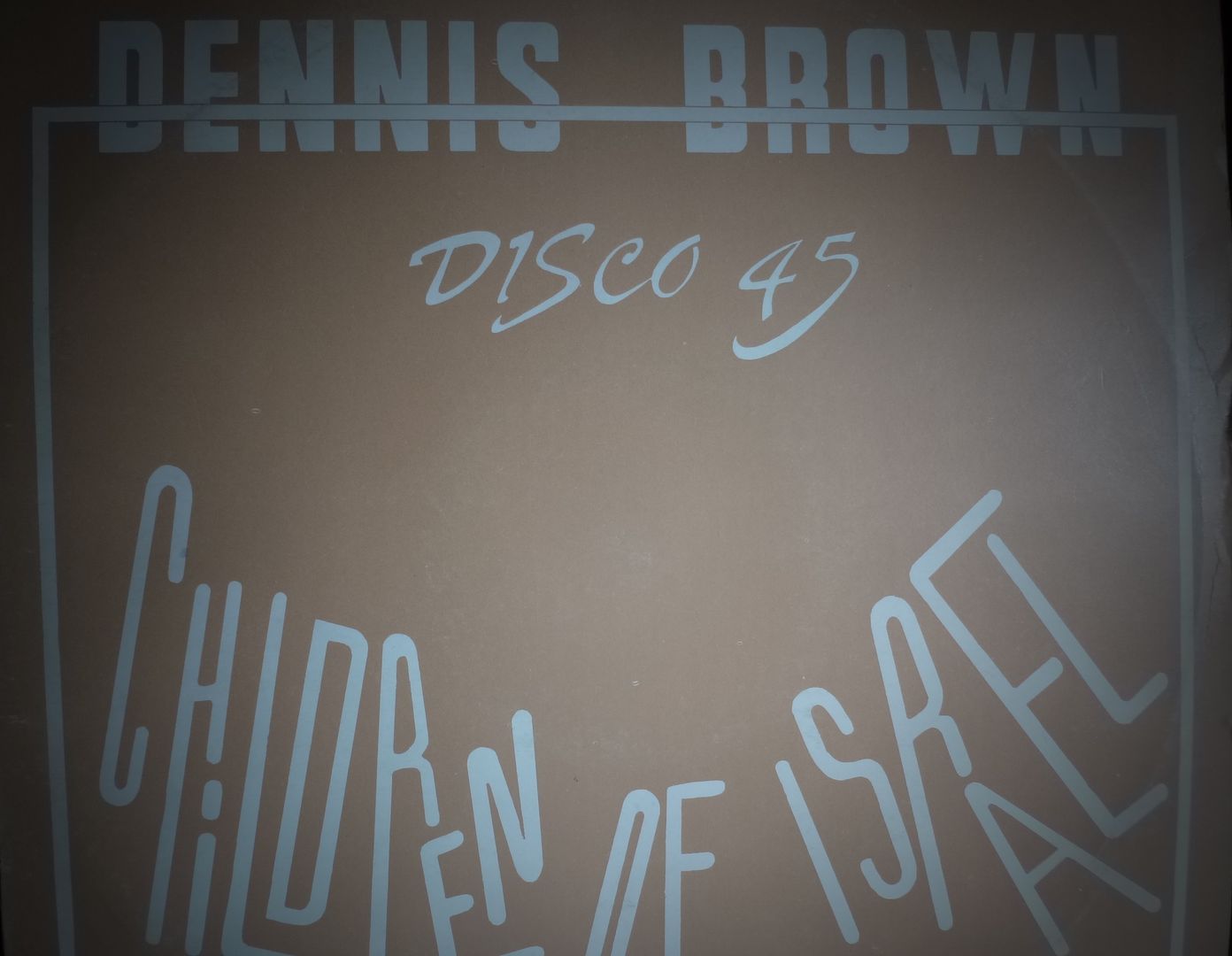
Dennis Brown – Children Of Israel – Diamond Records – 1978
NAPHTALI: Naphtali was the son of Jacob and Rachel’s maidservant Bilhah and the father of the tribe of Naphtali, one of the twelve tribes of Israel. The tribe of Naphtali settled in northern Canaan and were described as brave soldiers in the Song of Deborah (Judges 5:18). Naphtali’s blessing from his father called him “a running deer” (Genesis 49:21). Naphtali was given his name because Rachel said “With great wrestling have I wrestled my sister” (Genesis 30:8). The name Naphtali means to be obtained by wrestling. This name was written in the Jasper stone which was transparent and signified water and fullness of glory. Transparent means that one is seen clearly. Through natural birth, Naphtali was wrestling / In blessing (Gen.49:21) Naphtali is a deer let loose (released, set free) with goodly words (fruit).
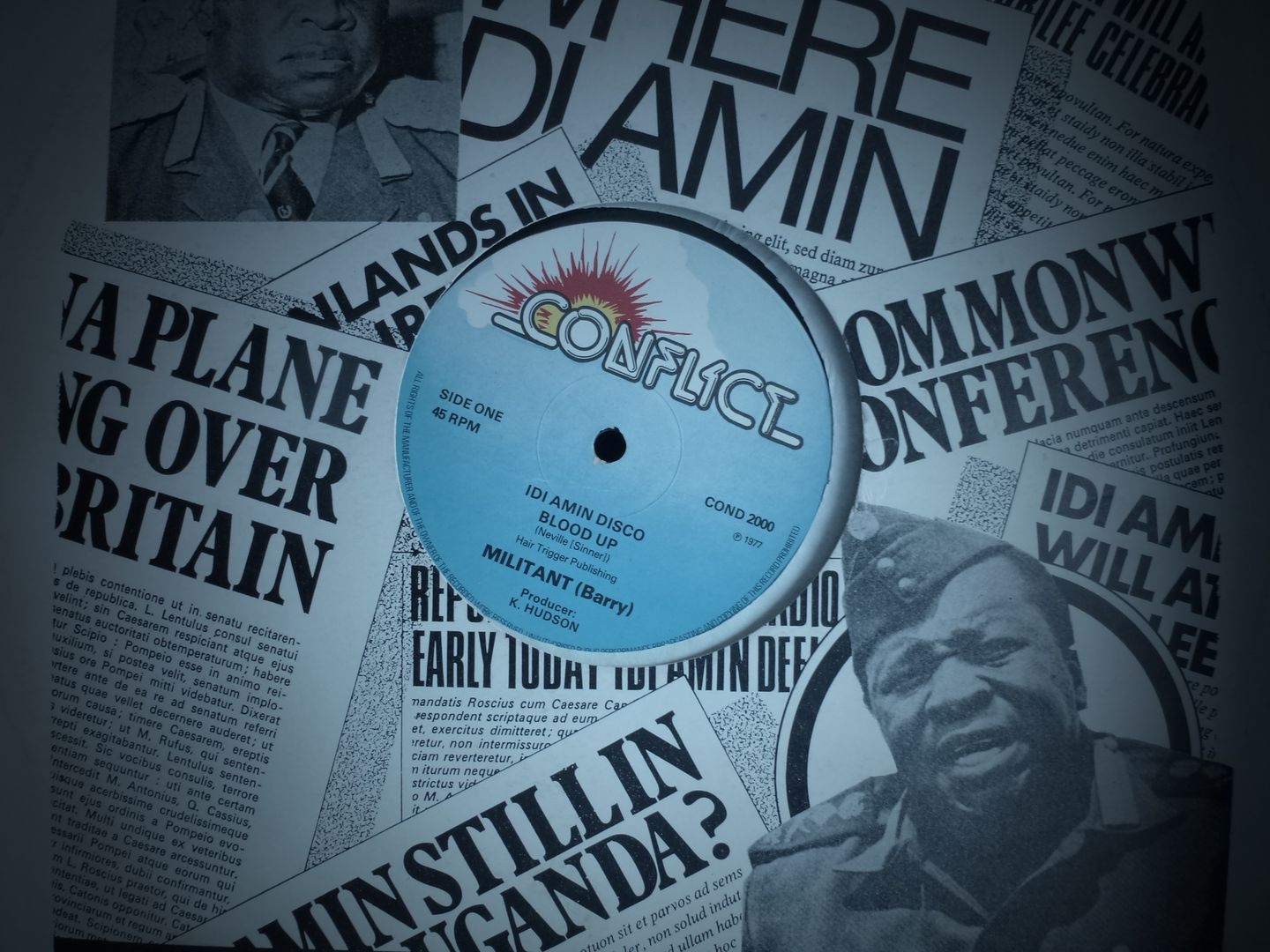
Militant Barry – Idi Amin Blood Up – Conflict Records – 1977
BENJAMIN: Benjamin was the son of Jacob and Rachel and father of the tribe of Benjamin, one of the twelve tribes of Israel. Originally named Ben-oni, or “son of my affliction” by his mother as she lay dying in labour, his name was later changed to Benjamin, meaning “son of my right hand” (Genesis 48:14). Next to Joseph, he was his favourite son. Benjamin the twelfth son of Jacob and born after Joseph was sold into slavery. After the family was invited to Egypt, Joseph sabotaged Benjamin’s sack by putting a silver cup in it and accusing the brothers of stealing. Joseph thought Benjamin would remain in Egypt but Judah offered to take his place, saying that his father would be devastated if Benjamin did not return. Jacob later blesses Benjamin while on his deathbed, calling Benjamin “a vicious wolf, devouring the prey in the morning, and dividing the spoil at night” (Genesis 49:27). Benjamin was born in Bethlehem and was the last son of Jacob and Rachel. The birthing of Benjamin brought the death of his mother and in her final moments, Rachel (soul) called him ‘Benoni’ (son of my sorrow), but Israel (spirit) called him Benjamin, meaning the son of my right hand (Gen 35:18). Also means: in the widest sense of son (grandson, great-grandson, etc. thereby covering all generations to come). It was the bringing of Benjamin to Joseph in Egypt that released the provision of food to Israel (Jacob).

The Congos – Solid Foundation – Upsetter Records – 1977
MANASSEH: Manasseh was the son of Joseph and Asnat (Pharoah’s daughter) and brother of Ephraim. Jacob adopts both Manasseh and his brother Ephraim as part of the tribe of Simeon and Reuben. Although Manasseh was technically the eldest son, he does not receive the greater blessing. Ephraim does, as Jacob foresaw that his descendants were more worthy of the blessing than Manasseh’s (Genesis 48:13-20).

Bim Sherman And Jah Buzz – Love Jah Only – Hitrun Records – 1979
EPHRAIM: Ephraim was the brother of Manasseh, and the son of Joseph and Asenath, Pharoah’s daughter. Jacob adopted the two sons as part of the tribe of Simeon and Reuben. Ephraim received the blessing of the first-born, although Manasseh was the eldest, because Jacob foresaw that Ephraim’s ancestors would be greater than his brother’s (Genesis 48:13-20). The name of Ephraim was engraved in the Ligure stone which was considered to be a stone of mystery. The name Ephraim means to be doubly fruitful or productive. Joseph brought his two sons Mannasseh and Ephraim to receive their blessing from Jacob before his death. Although Mannasseh was the one that was to receive the blessing of the first-born (Deut. 21:17) in Joseph’s family, Jacob crossed his hands and laid his right hand upon Ephraim imparting the double portion blessing (Gen. 48:14).This act by his father was most mysterious to Joseph and quite upsetting.
Penguin • Post Author •
January 7, 2013 at 12:17 amAfter putting the work into this post I notice that Mediafire have somehow restricted a couple of the stand alone tracks. I know not how the company sets the restrictions but a couple of the links jump (probably quite fairly) into a itunes / Amazon download link. Amazing how the technology is so fast and amazing still that the restrictions were placed up almost immediately after uploading to Mediafire not after several weeks being on this blog! Nothing I can do about it, sorry. The whole set in it’s entirety is not at present affected so if you want to hear the ‘proper’ 12″ version of The Heptones ‘Book Of Rules’ from 1977 rather than buy the 1973 7″ single version, which is undoubtedly being sold via these adverts then you better download double quick! Seems that blogs trying to promote the odd track so browsers are interested in buying up product later on to the benefit of the copyright holders and record labels is getting harder.
Sean
January 7, 2013 at 7:06 pmFabulous, many thanks for this one
dan i
January 7, 2013 at 7:25 pmNicely done and a happy Orthodox Christmas to you sir!
Pity about the D Brown and Heptones, they are cracking tunes and I am sure iTunes/Amazon will not have the right mixes at all. Useful and interesting text about the Tribes, and a selection of lovely pictures. Pretty sure you have posted some of these already, but you cant have too much of a good thing, and some may have missed them.
Penguin • Post Author •
January 7, 2013 at 8:33 pmDownload the whole lot from the link that tops the post Dan, that gets you all the tracks. Mediafire placed a bar on those two singular links… Cheers.
devotionhooligan
January 8, 2013 at 1:22 pmI Just went ahead and downloaded your DJ set mick // excellent stuff indeed//xx
dan i
January 8, 2013 at 6:05 pmIt’s OK Penguin, I have those tunes already. It’s just a pity
baronvonzubb
January 8, 2013 at 10:33 pmclassic comp 🙂
ciaran
March 20, 2013 at 11:10 amgreat selection of tunes!
Patrick
August 1, 2013 at 10:44 pmGreat post with the great tunes, the Imrhu Asher one is especially good and completely new to me (a bonus that the dub is also really well done). I searched it out to buy the vinyl version but discovered its rather pricey (I think all of them probably are!)
AUGUSTO
November 15, 2019 at 1:44 pmAo autor pinguim… tudo ficou bom, te agradeço pelo belo trabalho
sobre as historias da bíblia sagrada e sobre a musica jamaicana. eu AUGUSTO PESQUISADOE AQUI DE SÃO LUIS DO MARANHÃO – BRASIL